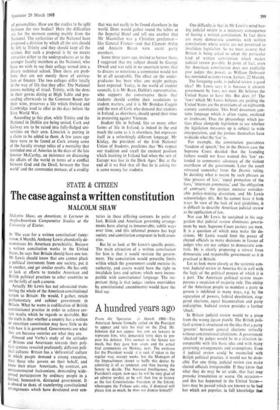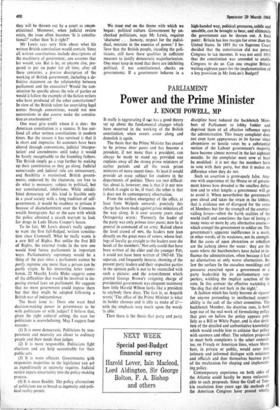The case against a written constitution
STATE & CITIZEN MALCOLM SHAW
Malcolm Shaw, an American, is Lecturer in Anglo-Anzerican Comparative Studies at the University of Exeter.
In The case for a written constitution' (SPEC- TATOR, 8 March), Anthony Lewis abundantly de- monstrates his American parochiality. Because a written constitution works in the United States, he says that Britain should have one too. Mr Lewis should know that one cannot pluck a political instrument from one society, put it in another, and get similar results. He has only to look at efforts to transfer American and British political practices to other countries to see the folly of such a course.
Actually Mr Lewis has not advocated trans- terring the whole of the American constitutional system to Britain. He would, I gather, retain Parliamentary and cabinet government in Britain. What he wants is codification of British constitutional practice in order to achieve cer- tain results which he regards as desirable. But the truth is that whether a country has a written or unwritten constitution may have little to do With how it is governed. Governments are what they are because societies are what they are.
Almond and Verba's study of the attitudes of Britons and Americans towards their poli- tical systems revealed profoundly different poli- tical cultures Britain has a 'deferential' culture in which people demand a strong executive, trust those who govern on their behalf, and know their place Americans, by contrast, are unreconstructed Jackson ians, demanding wide- spread participation by ordinary people in a !united, hemmed-in, distrusted government. It • Is absurd to think of transferring constitutional arrangements which have developed over cen-
turies in these differing contexts. In point of faot, British and American governing arrange- ments have altered in innumerable, subtle ways over time, and this informal process has kept society and constitution congruent in both coun- tries.
But let us look at Mr Lewis's specific points. The main attraction of a written constitution for him is that it would restrain the govern- ment. The constitution would prescribe limits within which the government could exercise its authority, and courts would have the right to invalidate laws and actions which were incom- patible with constitutional language. The im- portant thing is that judges (unless overridden by constitutional amendments) would have the final say. One difficulty is that in Mr Lewis's mind hav- ing judicial review is a necessary consequence of having a written constitution. In fact there are many democratic countries with written constitutions where courts are not permitted to
invalidate legislation. So we must assume that Britain is being asked to adopt the particular kind of written constitution which makes judicial review possible. In point of fact, even the American constitution does not explicitly give judges this power, as William Dobrovir has reminded us (SPECTATOR. Letters, 22 March), The foregoing aside, is judicial review a good idea? Mr Lewis says it is because it ensures government by laws, not men. He believes the United States to have this But does it? The 'laws' which Mr Lewis believes are guiding the United States are the provisions of an eighteenth century constitution. This brief document con- tains language which is often vague, outdated or irrelevant. Thus the phraseology which jus- tices place alongside legislation to see whether the legislation measures up is subject to wide interpretation, and the justices themselves have to decide what the law' is.
For example, the constitution guarantees 'freedom of speech,' but in the Dennis case the Supreme Court decided that the founding fathers would not have wanted this 'law' ex- tended to communist advocacy of the violent overthrow of the government. Later the court retreated somewhat from the Dennis ruling. In deciding what is meant by such phrases as 'due process of law,' equal protection of the laws,' interstate commerce,' and 'the obligation of contracts,' the justices exercise consider- able policy-making discretion, and Mr Lewis acknowledges this. But he cannot have it both ways. In view of the lack of real guidelines, it is difficult to describe American judicial review as the application of law.
Nor can Mr Lewis be sustained in his sug- gestion that judicial review eliminates govern- ment by men. Supreme Court justices are men. It is a question of which men make the de- cisions. Mr Lewis would limit the power of elected officials to make decisions in favour of judges who are not subject to democratic con- trols. He is clearly proposing a retreat from democratic and responsible government as it is practised in Britain.
Let us look more closely at the systemic con- text. Judicial review in America fits in well with the logic of the political process of which it is a part. The American political system incor- porates a suspicion of majority rule. The ability of the American people to mandate a party to govern is inhibited in many ways, e.g. by the separation of powers, federal devolution, stag- gered elections, equal bicameralism and party indiscipline. Judicial review provides a further 'check.'
In Britain judicial review would be a piece from the wrong jigsaw puzzle. The British poli- tical system is structured on the idea that a party 'governs' between general elections virtually without constitutional inhibitions. A government 'checked' by judges would be in a situation in- compatible with this basic idea and with many governing arrangements and assumptions. Even if judicial review could be reconciled with British political practice, it would not be desir- able. For one thing, judicial review can make elected officials irresponsible If they know that what they do may be set aside, that fact may provoke irresolution or worse. On occasion— and this has happened in the United States— laws may be passed which are known to be bad but which are popular, in full knowledge that
they will be thrown out by a court as uncon- stitutional. Moreover, when judicial review exists, the issue often becomes 'Is it constitu- tional?' rather than 'Is it right?'
Mr Lewis says very little about what his written British constitution would contain. Since all written constitutions include descriptions of the machinery of government, one assumes that his would, too. But is he, or anyone else, pre- pared to put on paper for all time, after all these centuries, a precise description of the working of British government, including a de- finitive statement on the relationship between parliament and the executive? Would the con- stitution be specific about the role of parties or would it follow the example of the fiction writers who have produced all the other constitutions? In view of the British talent for overriding legal norms through conventions, would not new conventions in due course make the constitu- tion an anachronism?
One must give credit where it is due: the American constitution is a success. It has out- lived all other written constitutions in modern times. But The reason it has survived is that it is short and imprecise. Its contours have been altered through conventions, judicial Interpre- tation' and amendments until today it would be barely recognisable to the founding fathers. The British simply go a step further by making up their constitution as they go along. Judicial somersaults and judicial rule are unnecessary, and flexibility is maximised. British govern- ments, endorsed by the electorate, are free to do what is necessary, subject to political, but not constitutional, inhibitions. While uninhi- bited democracy of this kind is feasible only in a good society with a long tradition of self- government, it would be madness to jettison it because of disenchantment over the Common- wealth Immigrants Act or the ease with which the police obtained a search warrant to look for drugs in Lady Diana Cooper's house.
To be fair, MC Lewis doesn't really appear to want the first full-fledged, written constitu- tion since Cromwell. What he really wants is a new Bill of Rights. But unlike the first Bill of Rights, the external truths in the new one would bind future parliaments in important ways. Parliamentary supremacy would be a thing of the past since a parliament cannot be partly supreme any more than a person can be partly virgin. In his interesting letter (SPEC- TATOR, 22 March), Leslie Blake suggests some of the difficulties that would be involved in im- posing eternal laws on parliament. He suggests that no mere government could impose them but that they might be adopted following a British war of independence.
The basic issue is: Does one want final decision-making power in government to be with politicians or with judges? I believe that, given the right cultural setting, the case for politicians is overwhelming. May I suggest four reasons: (1) It is more democratic. Politicians by tem- perament and necessity are closer to ordinary people and their needs than judges.
(2) It is more responsible. Politicians fight elections and are held accountable for their public acts (3) It is more efficient. Governments with responsive majorities in the legislature can act as expeditiously as necessity requires. Judicial review injects uncertainty into the policy-making process.
(4) It is more flexible. The policy alternatives of politicians are as broad as ingenuity and poli- tical reality permit. We must end on the theme with which we began: political culture. Government by un- checked politicians, says Mr Lewis, requires 'character. . . honesty, respect for the indivi- dual, restraint in the exercise of power.' I be- lieve that the British people, incuding the poli- ticians, still have these qualities in sufficient measure to justify democratic majoritarianism. One must keep in mind that there are inhibiting political, if not constitutional, checks on governments. If a government behaves in a high-handed way, political pressures, subtle and unsubtle, can be brought to bear, and ultimately the government can be thrown out. A final point: Britain has less margin for error than the United States. In 1895 the us Supreme Court decided that the constitution did not permit Congress to tax incomes. It was not until 1913 that the constitution was amended to enable Congress to do so. Can one imagine Britain waiting eighteen years for the implementation of a key provision in Mr Jenkins's Budget?







































 Previous page
Previous page